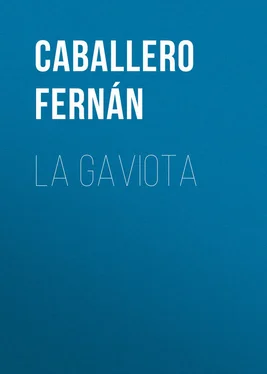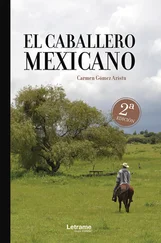Fernán Caballero - La Gaviota
Здесь есть возможность читать онлайн «Fernán Caballero - La Gaviota» — ознакомительный отрывок электронной книги совершенно бесплатно, а после прочтения отрывка купить полную версию. В некоторых случаях можно слушать аудио, скачать через торрент в формате fb2 и присутствует краткое содержание. Жанр: foreign_antique, foreign_prose, на английском языке. Описание произведения, (предисловие) а так же отзывы посетителей доступны на портале библиотеки ЛибКат.
- Название:La Gaviota
- Автор:
- Жанр:
- Год:неизвестен
- ISBN:нет данных
- Рейтинг книги:3 / 5. Голосов: 1
-
Избранное:Добавить в избранное
- Отзывы:
-
Ваша оценка:
- 60
- 1
- 2
- 3
- 4
- 5
La Gaviota: краткое содержание, описание и аннотация
Предлагаем к чтению аннотацию, описание, краткое содержание или предисловие (зависит от того, что написал сам автор книги «La Gaviota»). Если вы не нашли необходимую информацию о книге — напишите в комментариях, мы постараемся отыскать её.
La Gaviota — читать онлайн ознакомительный отрывок
Ниже представлен текст книги, разбитый по страницам. Система сохранения места последней прочитанной страницы, позволяет с удобством читать онлайн бесплатно книгу «La Gaviota», без необходимости каждый раз заново искать на чём Вы остановились. Поставьте закладку, и сможете в любой момент перейти на страницу, на которой закончили чтение.
Интервал:
Закладка:
“Brother Gabriel,” replied the good Mama Maria, “since this holy constitution, all is changed, all is metamorphosed. This clique, who govern to-day in place of the king, wish that nothing should remain of what formerly existed; it is for that they no longer permit the Jews to wear tails on their backs, although they always before carried them, as does the devil. If the holy father said to the contrary it is because it is obligatory, as they are obliged to say at Mass, ‘Constitutional king.’ ”
“That may be so,” said the monk.
“He is not a Jew,” pursued the old woman; “rather is he a Turk or a Moor, who has been shipwrecked on our coast.”
“A pirate of Morocco,” replied the good brother, “it may be.”
“But then he would wear a turban and yellow slippers, like the Moor I have seen thirty years ago, when I was in Cadiz. They called him the Moor Seylan. How handsome he was! But for me his beauty was nothing: he was not a Christian. After all, be he Jew or Moor let us relieve him.”
“Assist him, Jew or Christian,” repeated the brother. And they both approached the bed.
Stein had raised himself up in a sitting position, and regarded with astonishment all the objects by which he was surrounded.
“He does not understand what we say to him,” said the good Maria. “Let us try, nevertheless.”
“Let us try,” added Gabriel.
In Spain, the common people believe that the best way to make themselves understood is to speak very loud. Maria and Gabriel, with this conviction, cried out both together: “Will you have some soup?” said Maria. “Will you have some lemonade?” said the brother.
Stein, whose ideas became clearer little by little, asked in Spanish:
“Where am I? who are you?”
“He,” replied the old woman, “is brother Gabriel; I am grandma Maria, and we are both at your orders.”
“Ah!” said Stein, “from whom do you take your names? The holy archangel and the holy Virgin, guardians of the sick and consolers of the afflicted, will recompense you for your good action.”
“He speaks Spanish!” cried Maria with emotion; “and he is a Christian! and he knows the litanies!”
In her access of joy, she approached Stein, pressed him in her arms and bravely kissed his forehead.
“Decidedly, who are you?” she said, after having made him take a bowl of soup. “How, ill and dying, have you reached this depopulated village?”
“I am called Stein, and I am a surgeon. I was in the war at Navarre. I came by Estremadura to seek a port whence I could embark for Cadiz, and then regain Germany, my country. I lost myself in my route: I made a thousand detours and finished by arriving here, worn out by fatigue and ready to give up the ghost.”
“You see,” said Maria to brother Gabriel, “that his books are not in the Hebrew language, but in the language of surgeons.”
“That’s true,” repeated brother Gabriel.
“And which party do you belong to?” asked the old woman. “Don Carlos, or the other?”
“I serve in the troops of the Queen,” replied Stein.
Maria turned towards her companion, and with an expressive gesture, said in a low voice:
“He is not with the good.”
“He was not with the good,” repeated brother Gabriel, in bowing his head.
“But where am I?” again demanded Stein.
“You are,” replied the old woman, “in a convent which is no longer a convent. It is a body without a soul. There remain but the walls, the white cross, and brother Gabriel. The others have taken away all the rest. When there was nothing more to take, some gentlemen whom they call the public credit searched for a good man to guard the convent – that is to say, its carcass. They heard my son spoken of, and we came and established ourselves here, where I live with my son, the only one who would remain. When we entered into the convent, the fathers went away. Some retired to America or rejoined the missions in China; some returned to their families; some demanded their subsistence or work, or had recourse to alms. We have with us a monk, borne down by age and grief, who, seated on the steps of the white cross, weeps sometimes for the absent brethren, sometimes for the convent which they have abandoned. ‘Will not your Reverence come here,’ a child but lately attached to the services of the chapel said to him. ‘Where would you that I go?’ he replied. ‘I will never go away from these walls, where I was, poor and an orphan, received by the good fathers. I know nobody in the world, and know nothing but how to take care of the garden of the convent. Where shall I go? What shall I do? I can live only here.’ ‘Then remain with us.’ ‘Well said, mother,’ replied my son; ‘we are seven seated at the same table; we will be eight, and, as the proverb says, We will eat more, and we will eat less.’ ”
“Thanks to this act of charity,” said Gabriel, “I remain here, I take charge of the garden; but since they have sold the large pump, I do not know how to water a foot of ground; the orange and lemon trees dry up under my feet.”
“Brother Gabriel,” continued the grandma, “will not quit these walls to which he is attached like the ivy; he also says, ‘Very well, there remain but the walls. The barbarians! They have proved this maxim: Destroy the nest, the birds will never come back again.’ ”
“Notwithstanding,” hazarded Stein, “I have heard said there are too many convents in Spain.”
Maria fixed her black sparkling eyes on the German, and said to herself in an undertone:
“Were our first suspicions well founded?”
CHAPTER IV
THE end of October had been rainy, and November sheltered herself under her thick green mantle.
Stein took a walk one day in front of the convent. A magnificent panorama presented itself to his sight: at the right, the limitless sea; at the left, solitude without end. Between them, on the horizon, was painted the black profile of the fort San Cristobal. The sea undulated softly, in raising without effort the waves gilded by the sun’s rays, like a queen who spreads out her gorgeous mantle.
Not far from thence was situated the village of Villamar, near a river as impetuous during winter, as calm and muddy during summer. The grounds around, well cultivated, presented the aspect of a chess-board, where each square revealed the thousand shades of green. Here shone the warm tints of the vine, then covered with leaves; there, the ash-colored green of the olive-tree; the emerald green of the fig-trees, which the rains of autumn had imparted growth to; further off still, the bluish-green hedges of aloes. At the mouth of the river were collected several fishermen’s boats.
Near the convent, upon a light hillock, stood a chapel; in front, a cross based on a block of masonry whitened with lime; behind this cross, a retreat of verdure: it was the cemetery. Stein went there to meditate upon the powerful magic of the works of nature, when he saw Momo leaving the farm and going towards the village. In perceiving Stein, Momo proposed to him to accompany him, and they both commenced their route. They arrived soon at the top of the hillock, near the cross and the chapel. This ascension, however short and easy, had taken away Stein’s strength, who was yet scarcely convalescent. He rested an instant; then he entered the chapel, whose walls were covered with “ exvotos .” Among these exvotos there was one which singularly attracted by its strangeness. The front of the altar contracted itself towards the base in describing a curved line. Stein perceived there in the obscurity an object supported against the wall, and the form of which he could not distinguish. Fixing his earnest scrutiny on this object, he became assured it was a carbine. The size was such, and the weight must have been so great that it was incomprehensible how one single man could have the strength to place it in that position: it is but the reflection which is always inspired by the sight of the armor of the middle ages. The mouth of the carbine was so large that an orange could easily be introduced. The arm was broken, and the pieces were artistically put together by means of little cords.
Читать дальшеИнтервал:
Закладка:
Похожие книги на «La Gaviota»
Представляем Вашему вниманию похожие книги на «La Gaviota» списком для выбора. Мы отобрали схожую по названию и смыслу литературу в надежде предоставить читателям больше вариантов отыскать новые, интересные, ещё непрочитанные произведения.
Обсуждение, отзывы о книге «La Gaviota» и просто собственные мнения читателей. Оставьте ваши комментарии, напишите, что Вы думаете о произведении, его смысле или главных героях. Укажите что конкретно понравилось, а что нет, и почему Вы так считаете.











